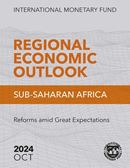At a Glance
- Current IMF membership: 191 countries
- Liberia joined the Fund on March 28, 1962.
- Quota: SDR 258.4 million
- Outstanding loans: RCF Loans SDR 32.30 million; ECF Arrangements SDR 76.03 million
- Article IV/Country Report: September 14, 2022. (IMF Country Report No. 22/296)
Liberia and the IMF
-
IMF Staff Concludes Mission to Liberia
November 20, 2024
An International Monetary Fund (IMF) staff team, led by Mr. Daehaeng Kim, Mission Chief for Liberia, visited Monrovia from November 6 – 19, 2024, to conduct the First Review of the Extended Credit Facility (ECF) arrangement approved on September 25, 2024.
-
October 11, 2024
Series:Country Report No. 2024/309
-
September 25, 2024
The Executive Board of the International Monetary Fund (IMF) has approved a 40-month arrangement under the Extended Credit Facility (ECF) for Liberia, amounting to SDR155 million (60 percent of the quota, or approximately US$210 million).
-
Liberia: IMF Reaches Staff-Level Agreement on a New 40-Month Extended Credit Facility Arrangement
August 26, 2024
International Monetary Fund staff and the Liberian authorities reached a staff-level agreement on a comprehensive set of policy priorities to support a new 40-month Extended Credit Facility (ECF) arrangement. The SDR 155 million arrangement is subject to approval by the IMF Executive Board. The board discussion is scheduled for September 25.
-
IMF Deputy Managing Director Antoinette Sayeh to Retire from the Fund
July 17, 2024
Kristalina Georgieva, Managing Director of the International Monetary Fund (IMF), announced today that Deputy Managing Director Antoinette Sayeh intends to conclude her service on September 12, 2024
Regional Economic Outlook
October 25, 2024
Sub-Saharan African countries are implementing difficult and much needed reforms to restore macroeconomic stability, and while overall imbalances have started to narrow, the picture is varied. Policymakers face three main hurdles. First, regional growth, at a projected 3.6 percent in 2024, is generally subdued and uneven, although it is expected to recover modestly next year to 4.2 percent. Second, financing conditions continue to be tight. Third, the complex interplay of poverty, scarce opportunities, and weak governance--compounded by a higher cost of living and short-term hardships linked to macroeconomic adjustment--are fueling social frustration. Within this environment, policymakers face a difficult balancing act in striving for macroeconomic stability while also working to address development needs and ensure that reforms are socially and politically acceptable. Protecting the most vulnerable from the costs of adjustment and realizing reforms that create sufficient jobs will be critical to mobilize public support.
Read the Report
Fraudulent Scam Emails
We would like to bring to the notice of the general public that several variants of financial scam letters purporting to be sanctioned by the International Monetary Fund (IMF) or authored by high ranking IMF officials are currently in circulation, and may appear on official letterhead containing the IMF logo. The scam letters instruct potential victims to contact the IMF for issuance of a “Certificate of International Capital Transfer” or other forms of approval, to enable them receives large sums of monies as beneficiaries. The contact e-mail information is always BOGUS and unsuspecting individuals are then requested to send their personal banking details which the scammers utilize for their fraudulent activities.For more information please see Fraudulent Scam Emails Using the Name of the IMF
Departmental Papers on Africa





